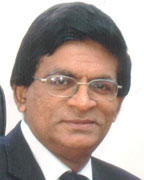Ocean University to make Lanka a global leader in marine science
by Ranil Wijayapala
The world's economic power shifting from one region to the other from
time to time. It was the United States and the Europe that became the
world economic power in the 19th and 20th centuries and Asia reins the
world economic power in the 21st century thus making Chindia the
combination of China and India the biggest economic power in the region
and making the Indian Ocean the 21st century ocean with a hive of
economic activities.
 |
Youth Affairs
and Skills
Development Minister Dullas Alahapperuma
|
 |
| Prof: Ranjith
Senaratne |
Sri Lanka, as an island nation which has transformed as an emerging
country in Asia, should be ready to take advantage of this situation to
recap what it has lost during the three-decade battle against terrorism
allowing the other Asian nations which were far behind Sri Lanka to
reach new heights in economic growth.
President Mahinda Rajapksa as a visionary leader, laid a strong
foundation for Sri Lanka to gain from this economic power shifting to
the Asian region after directing the country towards a new economic path
setting the targets to make Sri Lanka a naval and logistic, energy,
tourism and sports hub through the Mahinda Chinthana program.
In the process of transforming Sri Lanka into these hubs it initiated
the process of transforming its economy from a Green Economy to a Blue
Ocean Economy as President Rajapaksa stated the future of the country
lies in the ocean. In the march to transform Sri Lanka's economy into a
Blue Ocean economy, Sri Lanka took a step forward on August 20 by
passing a Bill in the Parliament to set up the Ocean University of Sri
Lanka.
According to Youth Affairs and Skills Development Minister Dullas
Alahapperuma who presented the Bill the establishment of the Ocean
University was yet another step forward by President Rajapaksa who
initiated the facilitation of ocean economy when holding the ministerial
portfolio of Fisheries in 1997 to broaden the opportunities for
education in the field of fisheries and maritime industry by proposing
the National Institute of Fisheries and Naval Engineering (NIFNE).
The government bestowed the Ocean University to the nation to further
enhance the opportunities for the young generation to enhancing their
education on scientific, technical and managerial skills in the fields
of fisheries, maritime sciences, maritime technologies and allied
fields, the Minister said presenting the Bill for approval in the House.
Professor Ranjith Senaratne, the Chairman of the Ocean University and
Deputy Chairman of the University Grants Commission, the mandate of the
Ocean University is to produce the trained manpower or to develop the
workforce required when making Sri Lanka a logistic and naval hub.
"The vision of the President will become a reality only when we are
having the required manpower. The Ocean University will facilitate to
provide necessary man power at vocational, craft, technical, security
management and scientific level to maintain these hubs", he added.
"To make Sri Lanka a logistic and naval hub we need to provide ships
coming to Sri Lanka repairing, maintenance and overhauling facilities.
To provide these services we need to have technically competent people.
The Ocean University produce technically competent people to provide
these services to the ships", he added.
Apart from this as a country which inherits a sea area eight times of
its land mass and with the potential of claiming a sea area 23 times of
its land mass under the United Nations Convention on the Law of the Sea
Sri Lanka also should equip with necessary manpower to make use of the
full potential of the sea for future prosperity.
"The Blue Economy, a new initiative pioneered by the Small Island
Developing States (SIDS) conceptualising oceans and 'development spaces'
is also relevant to all coastal states and countries with an interest in
waters beyond national jurisdiction. As an island nation Sri Lanka also
can turn its economy into a Blue Economy making use the technically and
scientifically competent people of the Ocean University", he said.
There are so many potential areas Sri Lanka can embarked on making
use of its sea for future prosperity and the relevant man power for
these industries is a key requirement for those development initiatives.
"For instance we can develop our country into a maritime sports hub
making use of 1750 km unpolluted coastal belt as we have year round
summer with sun and sea", he added.
"To mine the sea bed for valuable minerals like copper, cobalt, zinc,
manganese, sulphur etc we need manpower and the Ocean University is
geared to produce competent people for this task", Prof. Senaratne
added.
Marine bioprospecting- the search for novel compounds from natural
sources in the marine environment has rapidly increased in recent years.
Much of the increase in activity may be attributed to technological
advances in exploring the ocean. Today about 18,000 natural products
have been reported from marine organisms belonging to around 4,800
species.
"These marine natural products are used for pharmaceutical,
nutritional and personal care markets. For instance many anti -cancer
and cosmetic drugs are being producing from marine organisms. Sri Lanka
also can make use of its rich marine bio-diversity for these industries
once we produce experts on this field through the Ocean University", he
added.
"With the increasing population in the world which will grow at least
to 20 billion by 2020 we need to find new ways to producing foods. The
sea will be a prime source for food in future and we need to equip
ourselves to meet this challenge in the future by finding scientific
ways for sea farming and sea cultivation by producing experts on this
field through the Ocean University", he added.
Since Sri Lanka is close to the Silk Route there are lot of ship
wrecks scattered around the Indian ocean and they can be made use to
promote marine archaeology.
"We can start courses to promote marine archaeology in our University
after linking with an other university in the world may be in China,
Japan in promoting those courses and attract students to study marine
archaeology", he added.
"The Ocean University will teach all these subjects the fisheries and
aquaculture under one roof. This will also teach ship building ship
repairing and maintenance and aquaculture, sea farming, sea sports,
mining of sea bed, marine archaeology, maritime law", he added.
Therefore, the Ocean University will offer vocational courses from
certificate level to diploma level and degree programs to produce
competent people to manage and maintain them after providing them with
managerial, technical and scientific knowledge.
The ocean University will offer vocational courses on Off-shore
Fishing, Skipper Training, Safety at Sea, Life Saving and Diving, Sea
Sports and Maritime Recreation, Post Harvest Technology, Fisheries
Harbour Management, Aquaculture and Mariculture, Nautical Science,
Off-shore Exploration and Production of Gas and Oil, Marine Pollution,
Fibre Glass Technology, Maritime Heritage and Ecotourism, Maritime
Transportation, Management and Logistics, Maritime Security, Disaster
Management and Coastal and Marine Resources Management.
The degree programs scheduled under the University are Naval
Architecture, Maritime Transportation Management and Logistics,
Integrated Coastal and Marine Resources Management, Applied Maritime
Sports Science and Technology, Nautical Science, Port and Harbour
Management, Petroleum Science and Petroleum Engineering.
The enrollment of students for the Certificate and Diploma Courses
will be increased from 460 in 2014 to 1535 by the year 2017. The
enrollment of students for the degree programs will be increased from
300 in the year 2014 to 615 in the 2017.
Since the University has been established under Youth Affairs and
Skills Development Ministry youth will have easy access to these
vocational training and degree programs thus providing opportunities for
them to be qualified for the emerging job market in the future.
He said the Indian Ocean Rim Association with 20 member countries
including India, China, Australia is also proposing to establish Centre
of Excellence in ocean Sciences and Atmosphere Studies in Sri Lanka on
request made by External Affairs Minister Prof. G.L.Peiris.
"The Ocean University provides the ideal platform, the
infrastructural and Academic and intellectual atmosphere for this
centre", Prof. Senaratne added.
"We have been given 45 acres of land in Kalametiya in Hambantota for
the development of this University and Youth Affairs and Skills
Development Minister Dullas Alahapperuma is negotiating with several
countries to get financial assistance to this. By another three years
time we will have a state-of-the art Ocean University equipped with a
laboratory and workshop facilities and to produce man power in the
emerging sectors not only fishing in aqua culture, offshore drilling,
off shore exploration, sea bed mining, marine bio-prospecting maritime
recreation sea sports, marine archaeology, ship-building or anything",
he added.
"Therefore, the Ocean University will not only become a partner and
catalyst in transforming Sri Lanka into a logistic and tourism hub, but
it will also become a global leader in training and educating the people
in social sciences and allied fields and will help Sri Lanka to emerge
as a global leader in Education, Training and Research in Fisheries and
Marine Science and Technology", he added. |

